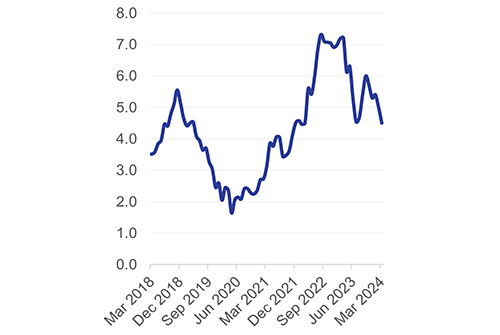The annual domestic inflation rate continued a rapid downward trend for the second consecutive month to 4.5% in March 2024 compared with February’s reading of 5%.
According to the Namibia Statistics Agency (NSA), this is the lowest inflation rate for the last eight months, and marks a significant deceleration from the 7.2% year-on-year (y/y) recorded in March 2023.
However, despite the swiftly declining inflation rate, analysts doubt this will translate into a reduction of the repo rate that would result in much-needed relief for consumers.
“Despite a decline in inflation to 4.5%, this will not trigger the central bank to cut the repo rate. My anticipation is that the repo rate will remain unchanged. The upward pressure on energy prices and geopolitical tensions continue to rise, with negative repercussions for commodity markets and global trade flows. The first repo rate cut will happen nearly at the end of the third quarter,” predicted economist Josef Sheehama.
Responding to New Era queries, he noted that in addition to risks associated with inflation, the possibility that the current growth slowdown may extend or even worsen should be considered.
“There can be no easing of the fight against inflation in terms of monetary policy. Steadily guiding inflation back to target levels continues to be the top priority. Repo rate cuts won’t be feasible as long as there is high unemployment, inflation, sluggish economic growth, and geopolitical tensions,” he stated.
Concurring with Sheehama’s stance, Mally Likukela said he does not believe the softening will translate into a repo rate reduction just yet.
“The central bank is most likely to take a hold-and-observe stance. This is normally done to give the monetary policy a longer observation period, namely to have a more comprehensive assessment of all variables under consideration. Also, the central bank likes to give the monetary policy transmission mechanism sufficient
time to adjust,” he explained.
In its latest inflation commentary, stock brokerage Simonis Storm (SS) stated that although its projections suggest a deceleration in inflation from an average of 5.9% in 2023 to 4.9% in 2024, it is important to note this does not necessarily translate into real gains, considering inflation levels still remain relatively high. SS pointed out potential risks to inflation, particularly food prices, which could be worsened by the El Niño weather phenomenon, alongside elevated oil prices.
The latest NSA figures indicate that the food and non-alcoholic beverages’ category continued its deceleration trend, with an annual inflation rate of 4.9% y/y in March 2024, a substantial slowdown from the 14.6% y/y recorded in March 2023. This deceleration is primarily attributed to the food sub-category, particularly within the bread and cereals line, which experienced deflation of 1.4% y/y in March 2024, compared to 20.8% y/y in March 2023. This aligns with the global downward trajectory of cereal prices.
SS further pointed out that the primary contributor to headline inflation remains the food and non-alcoholic beverages’ category, contributing one percentage point in March 2024, although this marks a slowdown from the 2.7 percentage points recorded in March 2023.
Moreover,a recent Reuters article highlighted that chocolate prices are continuously rising due to a deepening cocoa crisis in major producing countries such as Ghana and Côte d’Ivoire. The catastrophic crop failures caused by the swollen shoot virus have affected over 590 000 hectares of cocoa plantations in Ghana alone, resulting in significant shortages of cocoa beans.
“This phenomenon is reflected in Namibia’s consumer price index, where chocolate inflation stood at 4.7% y/y and ice cream at 12.4% y/y in March 2024, indicating that the effects of the cocoa crisis have not yet materialised in our market,” SS noted.
Also commenting on the latest inflation figures, FNB in its Consumer Price Index report stated their revised inflation forecast for Namibia anticipates a 4.9% headline inflation rate in April 2024 (previously 4.8%), with a 12-month average of 4.7% for 2024 (unchanged).
“This upward adjustment reflects the recent fuel price hikes implemented this month. Additionally, the rise in civil servant wages and the tax reforms enacted on 1 March 2024 are likely to support disposable income and increase consumer spending, which will potentially drive demand-side inflation.
The downside risk to this view is the elevated interest rate environment which may dampen the impact of these demand-side inflationary pressures,” FNB stated. Meanwhile, the World Bank has also observed inflationary cooling across most sub-Saharan African economies, falling from a median of 7.1 to 5.1% in 2024.
However, they stated that African inflation remains high compared to pre-Covid-19 pandemic levels. “Additionally, while growth of public debt is slowing, more than half of African governments grapple with external liquidity problems, and face unsustainable debt burdens,” the World Bank added.


